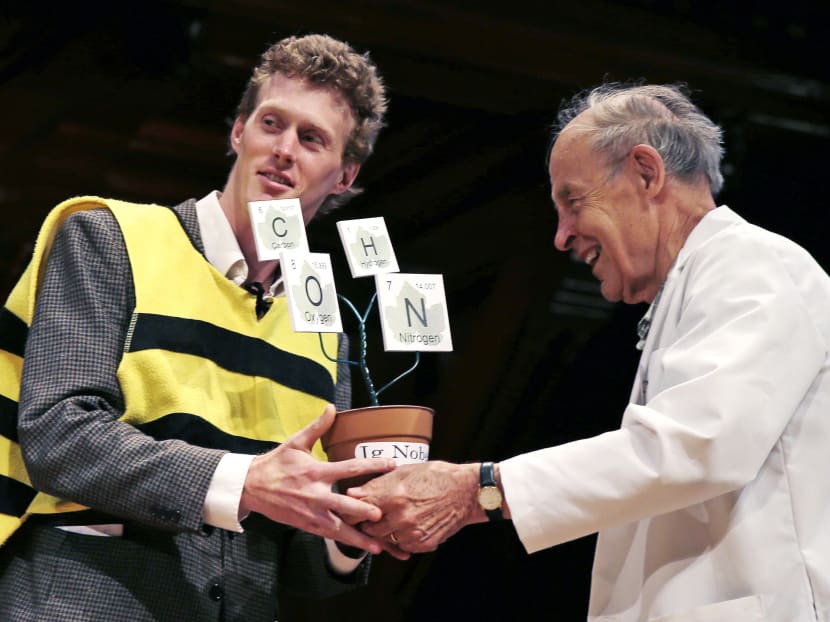Bee stings, research that makes you go 'huh?' win Ig Nobels
BOSTON — A Cornell University graduate student who allowed honeybees to sting him in 25 places and a group of scientists who concluded it's possible for one man to father 888 children are among the winners of this year's Ig Nobels, which honour humorous scientific achievement.

Mr Michael Smith, left, accepts his trophy from Dudley Herschbach, the 1986 Nobel Laureate in Chemistry, while being honored during a performance at the Ig Nobel Prize ceremony at Harvard University, in Cambridge, Massachusetts, Sept 17, 2015. Photo: AP
BOSTON — A Cornell University graduate student who allowed honeybees to sting him in 25 places and a group of scientists who concluded it's possible for one man to father 888 children are among the winners of this year's Ig Nobels, which honour humorous scientific achievement.
Mr Michael Smith estimates he was stung about 200 times during his 2012 honeybee study. His conclusion: The three most painful places to get stung are the nostril, the upper lip and the male sex organ.
"A sting to the nostril is so painful it's like a whole body experience," he said.
Other winners being honoured last night (Sept 17) at the 25th annual ceremony at Harvard University include a trio of linguists who discovered that almost every language in the world uses the word "huh" for clarification in a conversation and researchers who found that corporate CEOs take less professional risk if directly affected by natural disasters as children.
Real Nobel laureates hand out the prizes, and each winner receives a cash award: a Zimbabwean 10 trillion-dollar bill, the equivalent of a couple of US dollars.
Mr Smith shared the Ig Nobel for physiology and entomology with Justin Schmidt, an adjunct professor at the University of Arizona who devised a pain scale for insect stings.
His advice: Do not get stung by the tarantula hawk, a nasty looking wasp found in the Southwestern US with a stinger about a quarter-inch long.
"The sting is entirely nontoxic but hurts like the bejesus," Prof Schmidt said.
Dr Mark Dingemanse and two colleagues at the Max Planck Institute for Psycholinguistics in Nijmegen, Netherlands, won the Ig Nobel for literature for determining that the word "huh" is used in languages around the world, including some of the most obscure.
"A system for fixing misunderstandings is clearly a crucial part of language," he said. "'Huh?' is one element of this system: It's the basic error signal people fall back on if all else fails."
Dr Elisabeth Oberzaucher and a colleague at the University of Vienna in Austria won the mathematics prize for figuring out whether it was possible for Moroccan Emperor Moulay Ismael to have sired 888 children — and that's the conservative estimate.
Ismael fathered the children during a roughly 30-year reign that ended in 1727. It sounds exhausting, but the bottom line is, yes, it is possible to father that many children if he had sex daily. The study found that it could be done with as few as 65 women, not the 500 in his harem.
Raghu Rau, professor of finance at the University of Cambridge, and his colleagues won for their study that found business leaders more directly affected by natural disasters as children took less risk during their careers.
Prof Rau uses Apple as an example. Late CEO Steve Jobs, who lived through a deadly landslide near his home in San Francisco as a child, ran the company conservatively. His successor, Mr Tim Cook, witnessed few fatalities despite regular tornadoes while growing up in Alabama and has made more risky business decisions.
"Think of yourself as a member of a board of directors: When you try to hire a CEO, do you want a risk taker or not?" Prof Rau said.
As usual, the winners were thrilled with the honour.
"Sometimes these crazy things provide a lot of insight," said Schmidt, the bug guy. AP





